

Are the most innovative companies also the best places to work? Would you rather work for the second most innovative company in the world, or the best company to work for, in terms of culture and management credibility?
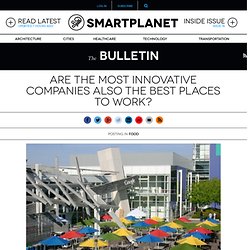
Perhaps not surprisingly, if you happen to work at Google, you're working at both of the above...if you believe annual rankings of corporate inventiveness and workplace satisfaction. This month, management consulting firm Boston Consulting Group (BCG) released its Most Innovative Companies list, and in its most recent issue, Fortune magazine features its 100 Best Companies to Work For ranking. Now each is interesting and debatable enough on its own, of course. But to take a look at the top 10 of both rankings and compare them offers a couple of worthwhile insights.
First, let's look at the top ten Most Innovative Companies (for 2012) from BCG. BCG's Most Innovative Companies: 1. 2. 3. 4. 5. 7. 8. 9. 12 business skills that will never, ever go out of style. This is the digital age -- throw everything we've ever known about succeeding in business out the window, right?
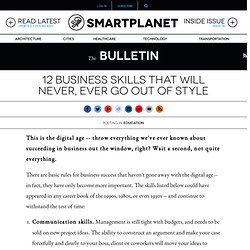
Wait a second, not quite everything. There are basic rules for business success that haven't gone away with the digital age -- in fact, they have only become more important. The skills listed below could have appeared in any career book of the 1990s, 1980s, or even 1930s -- and continue to withstand the test of time: Communication skills.
Management is still tight with budgets, and needs to be sold on new project ideas. (Thumbnail photo credit: Joe McKendrick.) Q&A: Bruce Nussbaum, author, ‘Creative Intelligence’ Resourceful Chinese motorists have found ways to cheat the radar system that identifies speeding cars by their license plates.
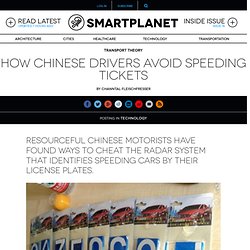
In the U.S., speeding motorists are usually pulled over by siren-blaring police cars. In China, however, drivers are not stopped on the highway. As is common practice in a number of countries, Chinese drivers get their tickets in the mail, after radars identify speeding cars by their license plate numbers. A typical traffic ticket costs around 200 yuan ($32). Naturally, resourceful citizens may be tempted to cheat the system. Recently, the practice has even created commercial opportunities: drivers can now purchase license-plate-number stickers (see image), which they can place over the original plate numbers.
Why more companies should offer sabbaticals. How many people do you know who have been paid by their company to take a sabbatical?
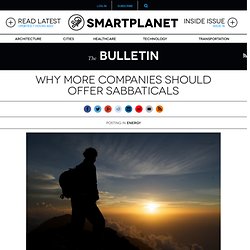
If you're from the United States you probably don't know many people who have been fortunate enough to get that long, paid break from work, unless they're in academia. Just how rare are fully-paid sabbaticals from work in the United States? According to a recent Society for Human Resource Management survey [PDF], only four percent of U.S. companies offer paid sabbatical benefits and 16 percent offer unpaid sabbaticals.
Even at CNN's so called "100 best places to work," less than one-quarter paid their employees to take paid sabbaticals. Of course, there are plenty of reasons why companies are hesitant to provide employees with a large chunk of time off, from concerns about costs and implementation to worry that employees might not want to return. But there are also some good reasons why it might be worth the risk. Read more: Huffington Post Photo: Flickr/andresAzp. Will management-free workplaces catch on beyond the tech sector? It's possible to run an organization without formal management titles, and some companies are already proving it can be done.
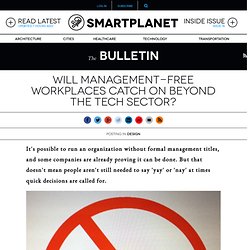
But that doesn't mean people aren't still needed to say 'yay' or 'nay' at times quick decisions are called for. Management-free workplaces are most likely to be found at some tech firms, which are run by teams of professionals versus chains of command. They are also more likely to have non-conformist founders who prefer to live outside of the box. Is this a trend that will catch on, just as informal dress and telecommuting spilled over from the tech sector into mainstream businesses in decades past? Home. Discover Your Workplace Personality Type. How To Find Out Whether You're A Good Cultural Fit At Any Company. I am a humanitarian, a strategist, and a rock.
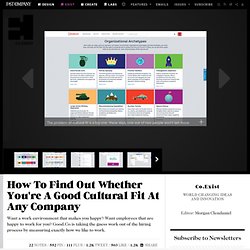
I thrive on stress, I’m good with deadlines, I’m big on communication, and I’m great at multitasking. These traits happen to make me a good fit at Fast Company, which is innovative, competitive, flexible, and ideological (at least according to my perceptions). So say the surveys on Good.Co, a new platform currently in semi-private beta that uses proven psychometric frameworks to help employers efficiently recognize people who would thrive in their unique environments--and on the flip side, to assist jobseekers and teams inside companies to figure out where they fit in the cultural landscape. Living in the San Francisco Bay Area, it often seems like companies are engaged in a never-ending war to project the most Google-like culture to potential hires.
But that’s the wrong way to go about things--not everyone works the best in that kind of environment. Good.Co’s current platform is just the beginning. This isn’t a replacement for LinkedIn.